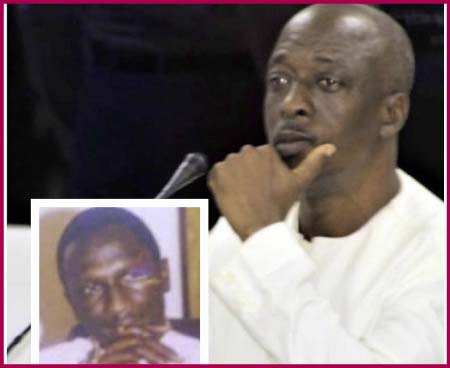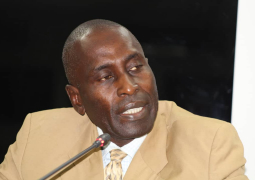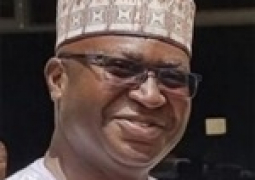
She was asked by the state counsel, A.M. Yusuf, the names of the council members of the AFPRC. She replied they were Yahya Jammeh, Edward Singhateh, Yankuba Touray, Sadibu Hydara, Kaba Bajo, Ebou Jallow and Sanna Sabally.
She was asked whether she knew why the accused named his child after Edward and not one of the other council members. In response, she told the court that she did not know. It was put to her that the accused chose Edward because of their relationship, but she said she did not agree.
“Can you remember anything that happened 25 years back?” she was asked.
“I saw it was published on the 24th June, 1995, that Koro was found dead in his car,” she replied.
It was then put to her that so she could remember Koro’s death happened on the 24th June, 1995. She stated that she did not say that on the 24th June, 1995, Koro died, adding that it was just recently she heard that Koro died on the 23rd June, 1995.
“It is correct that as of 24th June, 1995, you were not aware that Koro was dead,” it was put to her.
“I was aware,” she posited.
She was asked whether she could remember the first orderlies of the accused. She answered that she could remember Mr. Jally Musa Sowe and Mr. Ensa Mendy. She was asked whether she knew one Nuha Drammeh, but said she does not and she had never interacted with him.
It was then put to her that she does not know the first set of orderlies of the accused. She adduced that she only remembered Mr. Jally Musa Sowe and Ensa Mendy, noting further that she does not know the first set of orderlies of the accused.
“In June, 1995, who was the guard commander at Kerr Sering?” A.M. Yusuf enquired.
“I don’t know,” she responded.
Madam Minteh was asked whether she knew one Amat Jangum, and she answered in the positive. It was put to her that as at 23rd June, 1995, Amat Jangum was a guard at their residence at Kerr Sering. She said he was. She was then asked who the guard commander was after Jangum left, and she said she could not remember.
“Who was the first driver assigned to the accused when he became a minister?” the state counsel inquired.
“I cannot remember but there was Abdou Bah and another called Carlos and Lamin Ndure,” she answered. She was asked between Lamin Ndure and Pa Colley, who was first assigned to the accused as a driver. She stated that she did not know who reported first.
It was put to her that Lamin Ndure was first assigned to the accused before Pa Colley was posted there as a driver. She responded that she did not know. It was also put to her that Lamin Ndure was taking her to school and subsequently Pa Colley was driving her to school with the utility Benz, but she denied it.
“At the time you were staying at Bundung, where were you schooling?” A.M. Yusuf questioned her.
“At Serrekunda Primary School,” Madam Minteh replied.
She added that she walked to school. It was put to her that Ensa Mendy was the longest serving orderly to the accused while they stayed at Kerr Sering. She said he was there for long.
“Do you agree with me that the accused and Ensa Mendy had a good working relationship?” she was asked.
“Yes,” she stated.
She was told that there was no reason why Ensa Mendy would lie against the accused, and she said she had no idea. She was then asked whether she knew any reason why Ensa Mendy would lie against the accused. She said she had no reason.
“When Lamin Ndure was with the family, did you have any problem with him?” she was questioned.
“No,” she replied. Then the state counsel told her that it was correct that Lamin Ndure never had any problem with the accused when he was driving him. She said she had no idea. It was again put to her that Lamin Ndure and the accused had an excellent working relationship. She answered in the positive.
Continuing her testimony, she told the court that she knew one Aja Singhateh, who is related to Edward Singhateh. The state counsel asked her whether she knew the rank of Ensa Mendy at the time he was posted at Kerr Sering. She responded that she thought he was a lance corporal.
“As of 1995, can you remember his rank?” she was asked.
“I cannot remember,” she said.
It was put to her that Ensa Mendy was a private when he was posted at Kerr Sering, but she said she did not know. She was asked whether by the time she started school from Grade 1 to Grade 12, she repeated any class. She answered in the positive, adding that it was in Grade 1.
“After the 1994 coup, can you remember when the first presidential election was held?” she was questioned.
“In 1997,” she replied. It was put to her that her relationship with the accused is more than a brother-in-law, and she answered in the positive. She was told that it was correct that as she was staying in the residence of the accused to the extent that it was over seven years, she never slept in her father’s compound. She adduced that the accused was taking care of all her needs.
“It is correct that you can do anything possible to protect him from any harm,” it was put to her.
“Yes,” she stated.
At this junction, the state counsel told the court that he had finished the cross-examination of the witness. Defence Counsel Sissoho then told the court that he would not re-examine the witness, and asked the court to discharge her, which was done.
He informed the court that he had two motions to move, adding that one was dated 15th June, 2020. He said that it was for the production of the autopsy report of Koro Ceesay by the judicial secretary and the other one is for the production of the statement of Edward Singhateh at the TRRC. He cited Sections 220 and 221 of the Evidence Act to support his motions. He also cited Section 241 of the Evidence Act that a subpoena could be issued.
He stated that one of the motions was a 20-paragraph affidavit sworn to by one Muhammed Sissoho and they relied on all the paragraphs. He added that there was no affidavit in opposition. “It is trite law that any affidavit which stands unchallenged is deemed admitted. The document is essential to our defence,” he submitted.
He also informed the court that they wanted the judicial secretary to produce the TRRC report on Edward’s statement in relation to Koro’s death. “Without these documents, it will cause great hardship on the accused. It will also be a denial of the constitutional right of the accused,” he argued.
At this juncture, the state counsel informed the court that they intended to respond, and the matter was adjourned to the 6th July, 2020, for the state to respond.




